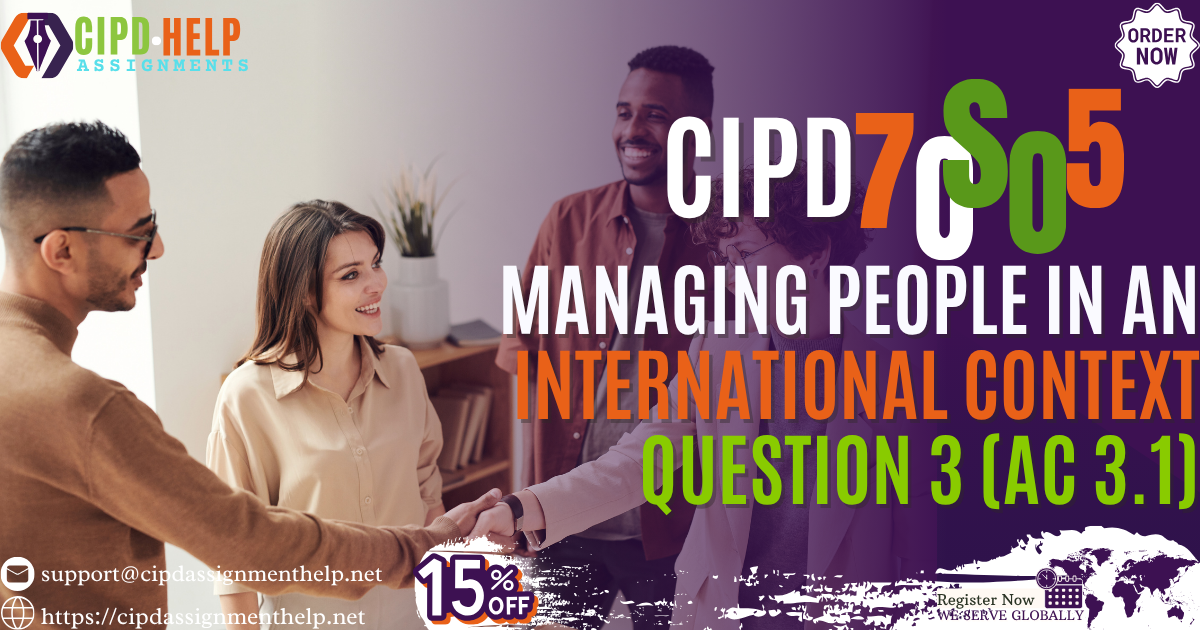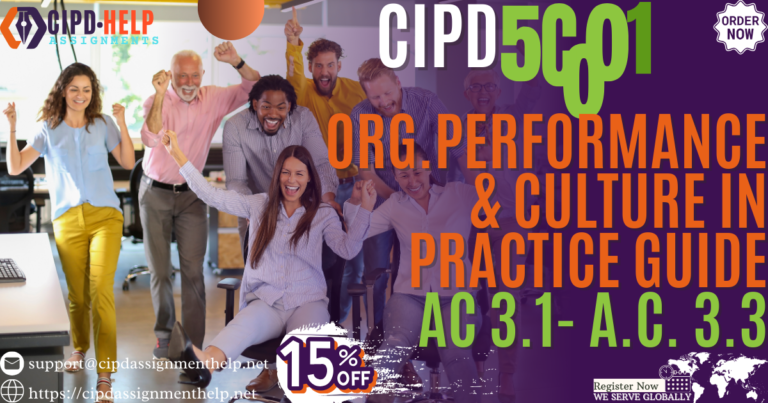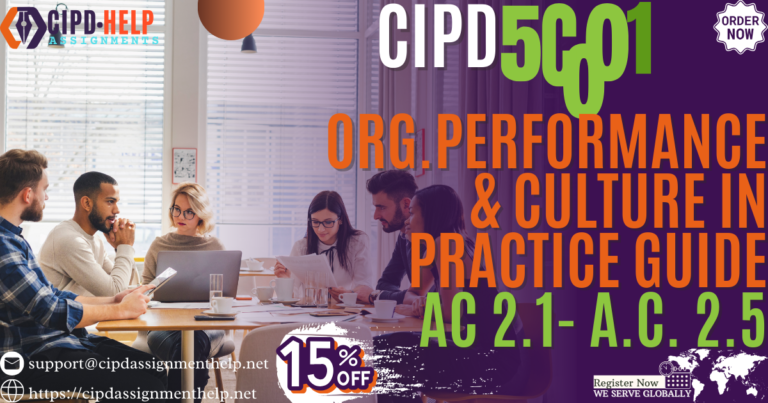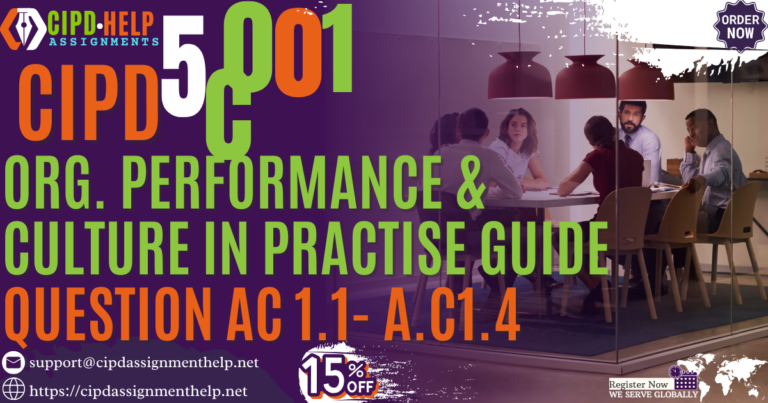7OS05 Managing people in An International Context Question 3 (AC 3.1)
7OS05 Managing people in An International Context Question 3 (AC 3.1) is less about answers and more about questions. Not surface-level ones, either. The module wants you to pause and think, really think about how HR practices land differently depending on where and how they’re used. What works beautifully in Sweden might unravel in Saudi Arabia. Or the other way around. There’s no formula.
It’s not the easiest unit to pin down, and that’s actually a strength. The focus on critical reflection can feel uncomfortable, especially if you’re used to step-by-step guides. But it sharpens your judgement. And that stays with you.
Case study
You work in a senior people management role in a UK-based clothing retail and distribution company that specialises in sportswear. It is called Fitter Threads Ltd and has grown considerably in recent years with the successful development of a big online store. The business model involves commissioning, sourcing and shipping products from factories based in developing countries for distribution, in the main, to customers in Europe and North America. Profit margins are excellent, but in recent years, as the company has expanded rapidly and new suppliers have been engaged, managers have been concerned about reliability of supply. Orders are not always delivered to the warehouse on time, and there have been justified complaints made by customers about a decline in product quality.
Senior managers have thus made the decision to acquire some garment factories in Asia and to start managing them directly. It is a risky decision, as the company has no experience at all of managing operations overseas, but it is considered strategically necessary in order to permit further expansion of the core business. Three manufacturing sites have been identified, all of which have established factories which already supply Fitter Threads Ltd, based in different countries. Deals have been done and in the next few weeks all three will become wholly-owned subsidiaries of the UK-based company. A long-term approach is being taken as far as people management strategy is concerned. Change will be introduced steadily over the next two years as investments are made in the new manufacturing operations with a view both to expanding them and upgrading plant and equipment. Meanwhile a two-pronged approach will be taken to the development of international managers:
i) Three experienced Fitter Threads Ltd personnel will be appointed to join the established management teams in each of the sites. This means that a total of nine UK nationals will be expatriated (potentially with their families) to work at senior levels in the newly acquired operations for a period of three to five years.
ii) Three experienced managers from each of the Asian factories will be invited to work in Fitter Threads Ltd’s UK operations over the coming year with a view to learning about the company’s systems, its culture and, particularly, its expectations in respect of people management. This means that nine people (again potentially with their families) will temporarily be ‘inpatriated’ from Asia to the UK.
Senior managers are particularly concerned to ensure that their new operations observe corporate norms in areas such as business ethics, environmental protection, health and safety, employee voice and fair recruitment practices. These all currently accord with ‘best practice’ principles as this term is generally understood in the UK. Managers are aware that such norms are presently very often not observed in their newly acquired operations as this is not common practice in the garment industry in the countries they are investing in. They understand that this will be challenging, but are very concerned not least for public relations reasons, to ensure that basic standards are maintained globally across all their sites in the future.
You are asked to provide advice to Fitter Threads Ltd’s senior management team. For the purposes of this assessment, you are free to choose which three locations in Asia you wish to research and write about. You must, however, choose three different countries.
Your final report should be 4000 words (+/- 10%) in length and should address each of the following questions fully and directly:
Question 3 (AC 3.1): Draw up an initial outline of a plan for the effective induction, orientation and socialisation of the nine people and their families who are going to be ‘inpatriated’ from Asia to the UK? What would be your top three recommendations? Justify your answer.
Step-by-Step Breakdown
First, what is the question really asking?
Let’s not rush to answer before we know what’s being asked. The question has three core pieces:
- Outline a plan – not in massive depth, but enough to show structure and direction.
- Focus on induction, orientation, and socialisation – these aren’t interchangeable. They’re connected but they do different things.
- Pick your top three recommendations and justify them – this means you’ll have to prioritise. Not everything is equally important. You’re being asked to take a position.
Understanding the Context: The Case Study Matters
You’re not writing a generic essay here. You’re writing with Fitter Threads Ltd in mind.
Let’s remind ourselves:
- This company is based in the UK, dealing in sportswear, and they’re expanding fast.
- They’ve bought three garment factories in three different Asian countries. Let’s say: India, Vietnam, and Bangladesh, that’s a reasonable and realistic selection for a UK-based clothing firm sourcing from Asia.
- They’re sending nine Asian managers and (potentially) their families to live and work in the UK for a year. They’ll be learning the culture, systems, and expectations around people management.
- That means we’re not just relocating professionals, we’re supporting whole families through a massive life transition. Not just professionally, but personally, socially, and culturally.
So, this is not just a work induction. It’s life induction.
Step 1: Define the Three Core Terms
Before writing the plan, you need to signal that you understand the focus areas.
Induction
This refers to the initial period when someone joins a new organisation. It usually covers practical aspects, job role, systems, policies, health and safety, etc.
At Fitter Threads, induction might include understanding the company’s reporting structure, health and safety expectations in the UK, pay and benefits processes, etc.
Orientation
This is broader. It’s about helping someone settle into the wider culture. Not just what the company does, but how things are done. the unwritten norms.
For inpatriated managers, orientation could involve understanding UK workplace culture, how managers interact with employees, how meetings are run, the balance between formal and informal communication, etc.
Socialisation
This is more ongoing. It’s about feeling part of the group, integrating into the workplace and the community. It goes beyond the job description. It’s the stage where someone begins to feel belonging.
For someone coming from Vietnam or Bangladesh, this could include making local friends, finding a religious community, accessing family support services, or just getting used to how people behave in public.
These distinctions are important. A strong student shows they grasp these layers.
Step 2: Drafting the Induction, Orientation and Socialisation Plan
Let’s get into the actual plan now. Think of it as three overlapping stages:
Stage 1: Pre-arrival Preparation (1-2 months before travel)
This part is often missed, but it matters. The experience starts before people land in the UK.
Key activities:
- Assign a UK-based buddy or mentor to each inpatriate manager. This helps early questions get answered informally.
- Send a welcome pack in advance. Not just company policies, but practical living guides. Housing, schooling (for those with kids), weather, banking, local customs, healthcare (NHS navigation can be confusing).
- Offer a virtual cultural briefing, a casual but structured session to talk about workplace expectations in the UK, especially things that might differ from home country norms. For instance, in Bangladesh, managers may be expected to give top-down instructions. In the UK, participative styles are often preferred.
Why this matters:
When people land in a new country, they’re already overwhelmed. Doing some groundwork before they even get on the plane reduces that shock. It sets expectations and builds confidence.
Stage 2: First Month in the UK – Induction & Orientation
This is the official welcome and learning period. Focused but humane.
Key activities:
- A structured two-week onboarding schedule, mixing:
- Introductory sessions with UK teams.
- Shadowing different departments.
- Training on HR systems and protocols.
- Introduce them to people policies, especially around equality, diversity, employee voice, and performance management.
- Organise an informal welcome gathering, maybe a lunch or team social. Something low-pressure. Doesn’t have to be big.
For families:
- Provide help finding schools, childcare, or places of worship.
- Offer access to a family liaison officer or HR partner, someone they can call with concerns that aren’t strictly work-related.
Why this matters:
It’s one thing to hand someone a staff handbook. It’s another to show them how people really interact in your company. Orientation has to feel like something you do with people, not to them.
Stage 3: Months 2–12 Ongoing Socialisation & Cultural Exchange
Socialisation takes time. It’s more personal, slower, and often overlooked.
Key activities:
- Set up monthly check-ins both formal (with line managers) and informal (with mentors).
- Create opportunities for peer sharing maybe short reflection sessions where inpatriates talk about what they’re learning and where they’re struggling.
- Offer intercultural workshops for UK-based colleagues too, make it a two-way exchange. Don’t make the Asian managers do all the adapting.
For families:
- Consider inviting families to company events, or even helping them connect to community clubs or language classes.
- Provide a small allowance or support for cultural outings like a museum trip or visiting a nearby city. These small acts can ease isolation.
Why this matters:
This stage is where true belonging happens or doesn’t. If people feel left alone after the first month, the goodwill built during induction fades.
Step 3: Your Top Three Recommendations With Justification
Now, out of everything above, you’re being asked to pick three priorities. This means deciding what matters most at the start of this transition.
Here’s a solid example:
1. Assign UK-based mentors to each inpatriate manager before arrival
Why?
Because human connection matters most. Before systems, policies, or training people need to know someone has their back. A mentor provides reassurance, guidance, and a safe space to ask “silly” questions without judgment. At Fitter Threads, this might be a mid-level manager who understands both the systems and the culture and can offer informal advice.
2. Run cultural orientation sessions for both inpatriates and their UK colleagues
Why?
Because the burden of adapting shouldn’t sit on the inpatriates alone. True cross-cultural working requires mutual understanding. If the UK team doesn’t understand why a Vietnamese manager hesitates to give negative feedback publicly, they might misread silence as incompetence. These sessions could use scenarios, role play, or discussion, not just PowerPoint slides.
3. Offer structured family support services (schooling, housing, social integration)
Why?
Because people don’t leave their personal lives behind when they go to work. If a manager’s child is unhappy at school, that manager will struggle at work. Providing logistical and emotional support for families isn’t just a kindness, it’s a risk-management strategy.
Final pointer
Let your conclusion feel natural. You’re not writing for a policy manual, you’re showing that you’ve thought this through with care.
Maybe something like: Bringing inpatriate managers to the UK isn’t just about technical skills or compliance. It’s about trust, belonging, and respect. If Fitter Threads wants people to carry its values forward, it needs to make those values visible through the way it welcomes people, not just the words in its policies.
Full Answer: Question 3 (AC 3.1)
When Fitter Threads Ltd made the decision to inpatriate nine managers from its newly acquired factories in Asia, it wasn’t just planning a workforce exchange, it was preparing for a deeper, more complicated cultural integration. These individuals aren’t just relocating for work; they’re entering unfamiliar communities, navigating new systems, and in some cases, bringing their families with them into an entirely different way of life. This shift needs thoughtful handling. Not just policies and checklists, but a real plan that reflects what it feels like to be a stranger arriving in a new workplace and country.
A structured plan can help avoid some of the confusion and stress that international assignments often bring. I’ve approached this by breaking the process into three overlapping stages: pre-arrival preparation, first-month induction and orientation, and ongoing socialisation. Each stage requires attention, not just for the managers themselves but for the people supporting them, both in the UK and back home.
Stage 1: Pre-Arrival Preparation
This first phase starts well before the flight is booked. It’s about making sure these nine inpatriates, and their families arrive in the UK with clarity rather than confusion.
Each person should be paired with a UK-based mentor, ideally someone who understands the company culture but also has time to engage on a personal level. This mentor doesn’t need to be a senior figure. In fact, sometimes it’s better if they’re someone more accessible, close enough in seniority to be relatable. The role is informal, but vital. It’s someone to message when you’re unsure if you need to bring your own lunch or what the polite way to challenge a colleague might be.
A simple welcome pack should be sent in advance. Not just policies and procedures, those will come later, but practical, honest guides about everyday life. How banking works. What to expect from public transport. School registration steps for families. What the weather might feel like if you’re used to Dhaka or Ho Chi Minh City. Even a few photos of their future office or local supermarket can make things feel less daunting.
And before they arrive, a short virtual session should be held, something informal, maybe an hour or two, where someone walks through what they can expect culturally. This is less about rules and more about rhythm: how people talk to each other at work, how meetings tend to run, how people ask for help. If people from Vietnam, India, or Bangladesh are coming into a workplace where hierarchy and communication norms are different, it helps to know that asking questions in a meeting isn’t seen as disrespect, it’s actually encouraged.
Stage 2: First-Month Induction and Orientation
Once the inpatriates and their families arrive in the UK, the real work begins.
A structured onboarding plan should run over the first two weeks, blending formal sessions with informal introductions. Time should be set aside for:
- Walking through the UK people policies.
- Understanding how performance reviews are done.
- Shadowing HR or operations teams.
- Visiting different stores or departments to see how the business actually functions.
It shouldn’t all be classroom-based. A good chunk of it should involve simply watching, listening, and asking questions. Pairing inpatriates with their mentors during this time allows space for less scripted conversations to happen, the kind that aren’t written into handbooks but that define how things really get done.
Just as crucial is a warm social welcome. An informal gathering, maybe a shared lunch or coffee morning, helps people feel noticed, not just processed. It’s easy to overlook that a lot of belonging comes from these small gestures.
The families, meanwhile, will need support too. An HR partner or family liaison officer should be available for queries, whether about healthcare registration, local community groups, or how to apply for school placements. Without this support, it’s easy for the family unit to feel isolated, which can quietly derail the assignment even if the workplace part runs smoothly.
Stage 3: Ongoing Socialisation and Belonging
The third phase stretches out over the coming year. It’s harder to script, but no less important.
The inpatriates should be given regular check-ins, some formal, but others more casual. These can include peer-sharing sessions where they reflect on what they’re learning and what feels unfamiliar. These aren’t performance reviews; they’re spaces for adjustment. What’s surprising them? What feels alien? Are they feeling connected, or adrift?
It’s also worth offering sessions for UK colleagues, too. If nine Asian managers are being asked to adapt to the UK way of doing things, then perhaps some space could be created for UK staff to understand the reverse. A short workshop or lunch session on cultural differences in management styles can open up dialogue and reduce misunderstandings. This shouldn’t be presented as “training” in a formal sense, it’s more like conversation with structure.
For the families, it helps to go beyond logistics. If there’s a local museum, weekend outing, or community event, offer an invitation. These small bridges to the outside world can help families feel rooted rather than floating.
My Top Three Recommendations
Now, if I had to narrow all of this down to just three essentials, the foundations, really, here’s where I’d focus:
1. Assign mentors before arrival
Nothing beats having a named person you can turn to. Mentors smooth over the odd bumps and offer context that no document can give. They help make the unfamiliar feel less alien. The value of this rises if the mentor is proactive, checking in rather than waiting to be asked.
2. Create cultural orientation spaces for everyone
Adapting to a new culture shouldn’t be a one-sided expectation. If we want the inpatriates to thrive, then it helps if UK colleagues also build awareness of the ways other cultures approach work, authority, and feedback. This can reduce the risk of small cultural misunderstandings growing into bigger issues.
3. Offer structured family support
People don’t function in isolation from their families. If someone’s child is having trouble adjusting or their spouse is feeling lost, it will almost certainly affect their work performance and mental wellbeing. Offering honest, hands-on support, especially in the first three months, can stabilise the wider experience and increase the likelihood of the placement succeeding.
Note
Settling into a new country, new job, and new life all at once is never easy. Even when the systems are working well, the human side needs time. Fitter Threads has made a bold choice, but it’s the care they show during this transition that will determine whether these nine managers return home with skills or frustration. A well-considered induction plan won’t remove every challenge, but it can show that the company values its people, not just as workers, but as whole individuals.
FAQs:
What kind of mindset helps in this unit?
One that’s open to ambiguity. The course rewards questioning more than certainty.
Are models and theories important here?
Yes, but not for memorisation. They’re more like conversation starters, you’re meant to challenge or reshape them.
How is assessment structured?
Typically essay-style tasks, asking you to evaluate international HR issues through contextual lenses.
Does group work feature in this module?
It might, depending on your course provider. But most assessment is individual.
Is this more HR-focused or business-wide?
It leans HR but always with a global business context in mind.





